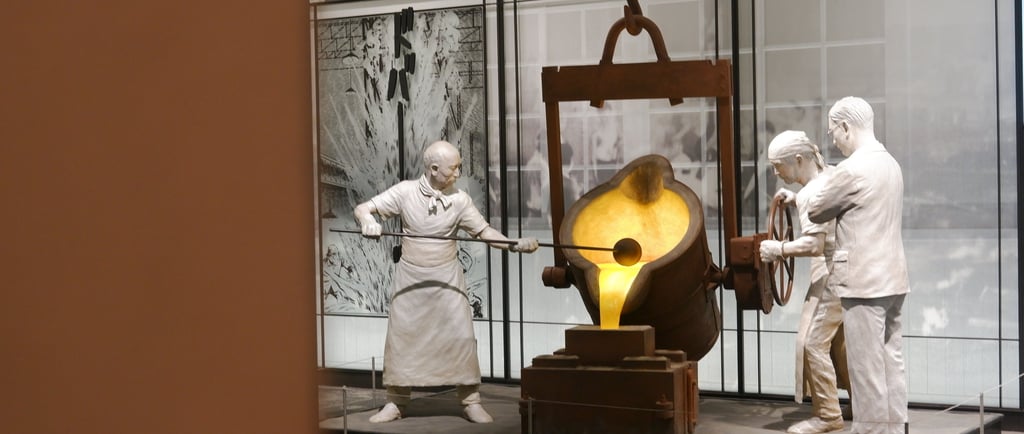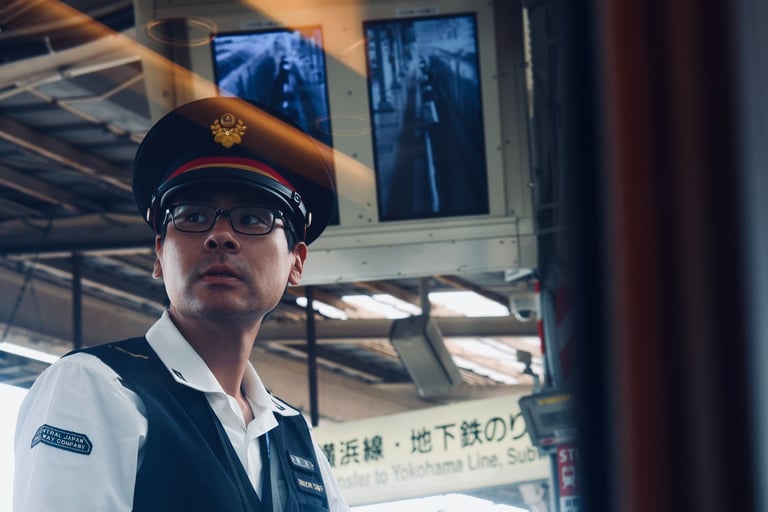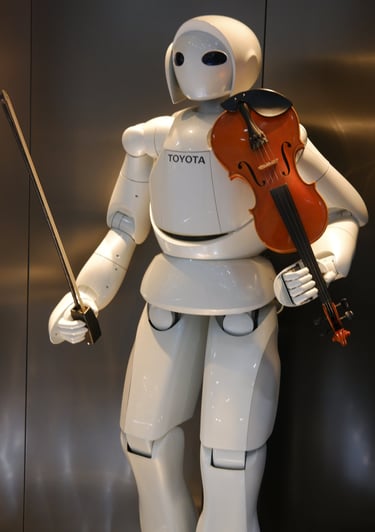Modern Work: A Study in Beautiful Absurdity
An anthropological study of the modern office: the absurdity of modern knowledge work exists in a paradox of simultaneous meaninglessness and value creation. What does it mean to be human in the workplace while performing the elaborate rituals of corporate culture?
MUSINGS
Kam Hussain
2/27/20255 min read


There's something fascinating about watching someone stride gallantly across an office, knowing that they might be en route to adjusting a font size on a PowerPoint deck. Or perhaps they might be closing a million-pound deal. The beauty is that both coexist. The absurdity is that both matter differently but neither really matters at all.
The thing is - we rarely see our friends and family actually ‘working’ - we only hear their tortured work stories over dinner. But here, in the office, we witness the daily performance of modern work unfold. It’s a sight that ought not to be seen. Similar to how the opposite is true, when you unintentionally see colleagues exist outside of work. We really shouldn’t be seeing our friends and family do the thing that earns them their livelihood. It seems untoward. Like you’ve seen them naked. Incredibly vulnerable. It makes explicit the reason for them existing in this space is because of money. And money and earnings is still taboo. It seems undignified? And in the flesh, there’s nowhere to hide, although increasingly with hybrid work… everyone’s hiding. Arguably, pretending to work. Is this all just different genres of theatre?
There's a stark contrast from previous generations though, where work bore a direct relationship to survival. Factory workers built tangible goods like cars, for example, with their labour visibly converting to food on their family's table. There’s a dignity about that physical labour. Now, we have grown adults, still with mortgages and children, supporting entire households on £35,000 by working as ‘data innovation managers'. The connection between labour and survival has become more abstract, but is it any less real? Running with the car theme, you probably have as many knowledge workers writing software for faster, smarter, and safer automobiles as labourers building the hardware itself.
This abstraction manifests itself in curious ways. Engineers type code and sales people close - which is clear and observable work. Then there are roles shrouded in layers of corporate jargon, where the day-to-day activities feel distant from their ultimate purpose. Someone in "innovation" or "strategy" attends endless meetings, with their output harder to grasp. Yet these same people return home to their families, pay their bills, live their lives. Is it really that important to differentiate between roles? And does this have a bearing on someone's worth in society? Probably not. You can have a programmer work on an irrelevant icon redesign and button functionality for the media centre dashboard of a car. Isn’t this all just a means to an end after all?
The oddly compelling thing for me is watching the human elements pierce through the professional veneer. Dave bites into his daily apple (must be Pink Lady) - a primal, routine act - before returning to his desk to optimise digital transformation strategies. Jane performs her precise departure routine each evening, gathering her instruments of work in chronology, after spending her day discussing "value realisation frameworks”. These tiny habits humanise the abstract office environment. You see people as creatures of comfort and routine; their small quirks and idiosyncrasies. The way they create order in their day with little pieces of home life bleeding into work life. There’s something intimate about witnessing these moments. You’re seeing people just... being. Is this their true self or is their home-self the final form. Just existing in their daily patterns. The unguarded moments between the “work”. It is what it is.
And then it’s onto sending that really important email to close the loop on all the circling back.
The anthropology of modern office life is surely absurd. Between twin 32-inch monitors displaying dashboards of OKRs, our primate nature can't help but peek through. There sits Sarah, meticulously arranging her desk ornaments before diving into a presentation about "organisational transformation”. Are we not just elaborate apes, performing increasingly abstract rituals in our glass and steel enclosures? Does no one see the monkey under the desk nodding his head side to side clanging his cymbals each time someone says, “Nothing from my side!” in the daily standup?
Then over there, watch closely as Tom performs his daily pilgrimage to the coffee machine, his movements as precise and meaningful as any ancient ceremony. Smooth like a gazelle, Later he'll use those same hands to print and scan documents, - but wait, he’s printed too many and now needs to use the shredder. He likes the sound of the shredder. Does he make this 'mistake' every day on purpose? This whole ordeal takes 35 minutes every day.
Sometimes, standing in the middle of an open-plan office, watching everyone perform their choreographed dance of modern work, you can't help but wonder if you're the only one seeing the beautiful absurdity of it all. Here we are, descendants of hunter-gatherers, bathed in the blue light of productivity tools, performing abstract labor that would be incomprehensible to our ancestors. Yet somehow, this elaborate ritual puts food on tables and pays mortgages in glamorous Croydon.
Perhaps I'm the only one who sees it - this dance between our fundamental human nature and the elaborate constructs of modern professional life. But then again, maybe everyone sees it, and we're all just playing our parts, staring blankly, whilst finishing our apricot yoghurt before returning to sending a 'Happy Brithday!' on the slack channel to a colleague in India who we don't know.
In SaaS Customer Success, you'll find genuinely nice people doing work that's simultaneously critical for SaaS businesses and somehow hard to explain to outsiders. They navigate between being friendly and professional, building careers from a role that didn't exist 15 years ago. Now they support families through "quarterly value delivery reviews" and "health scores”.
The paradox deepens as you observe the minutiae. Juan walks with grave purpose across the office - perhaps to close that million-pound deal, perhaps to centre a logo on a slide. A marketer agonises over the perfect tweet while wildfires rage outside. Are they just buying time, counting down the clock? Are they just thinking about what’s for dinner? Each task carries its own weight in this elaborate system we've constructed. They’re simultaneously meaningless yet the economy will continue to grow and go round. The person updating spreadsheets is also a parent, partner, friend but I only see a lab rat pushing a button. Is modern work dehumanising? is it against our nature?
There's no mockery in these observations. Every role, from janitor to CEO, deserves respect when approached with dignity, diligence, and care. I currently do many of the above mentioned roles in one as I’m desperately trying to maintain meaning in my day to day. Whether you're crafting social media content or cleaning floors, there's meaning to be found in doing it well. I think I’m getting stuck on joining the dots from the traditional tangible element of ‘hard’ and ‘honest’ work from modern office knowledge work? Well, I’m not sure what I mean by ‘hard work’ Perhaps it’s time to reimagine 'hard' and 'honest work' in the 'modern work world'.
The modern office is a place where the irresistible force of being human collide with the now immovable object of abstract knowledge work. We remain creatures of comfort and routine while participating in elaborate systems of professional value creation. A seeming house of cards where the stakes are both enormous and insignificant, and that's exactly what makes it fascinating. A purposeful walk across the office might be for something apparently trivial, but it's all part of the complex web that enables people to live their lives, support their families, and find their place in our peculiar modern world. Perhaps we all just need to play our part in this show with a wink and a nod.






